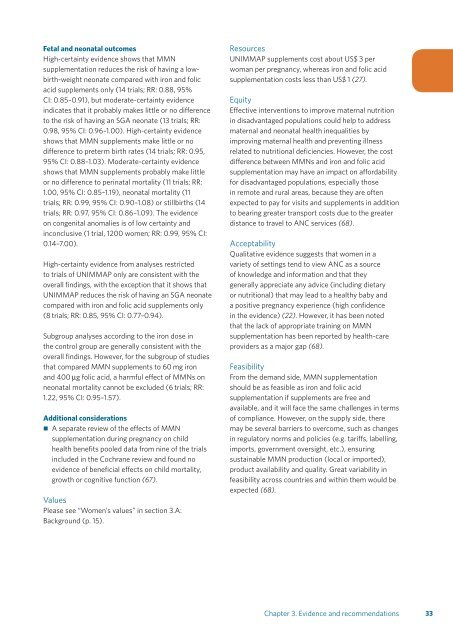WHO recommendations on antenatal care for a positive pregnancy experience
5pAUd5Zhw
5pAUd5Zhw
You also want an ePaper? Increase the reach of your titles
YUMPU automatically turns print PDFs into web optimized ePapers that Google loves.
Fetal and ne<strong>on</strong>atal outcomes<br />
High-certainty evidence shows that MMN<br />
supplementati<strong>on</strong> reduces the risk of having a lowbirth-weight<br />
ne<strong>on</strong>ate compared with ir<strong>on</strong> and folic<br />
acid supplements <strong>on</strong>ly (14 trials; RR: 0.88, 95%<br />
CI: 0.85–0.91), but moderate-certainty evidence<br />
indicates that it probably makes little or no difference<br />
to the risk of having an SGA ne<strong>on</strong>ate (13 trials; RR:<br />
0.98, 95% CI: 0.96–1.00). High-certainty evidence<br />
shows that MMN supplements make little or no<br />
difference to preterm birth rates (14 trials; RR: 0.95,<br />
95% CI: 0.88–1.03). Moderate-certainty evidence<br />
shows that MMN supplements probably make little<br />
or no difference to perinatal mortality (11 trials; RR:<br />
1.00, 95% CI: 0.85–1.19), ne<strong>on</strong>atal mortality (11<br />
trials; RR: 0.99, 95% CI: 0.90–1.08) or stillbirths (14<br />
trials; RR: 0.97, 95% CI: 0.86–1.09). The evidence<br />
<strong>on</strong> c<strong>on</strong>genital anomalies is of low certainty and<br />
inc<strong>on</strong>clusive (1 trial, 1200 women; RR: 0.99, 95% CI:<br />
0.14–7.00).<br />
High-certainty evidence from analyses restricted<br />
to trials of UNIMMAP <strong>on</strong>ly are c<strong>on</strong>sistent with the<br />
overall findings, with the excepti<strong>on</strong> that it shows that<br />
UNIMMAP reduces the risk of having an SGA ne<strong>on</strong>ate<br />
compared with ir<strong>on</strong> and folic acid supplements <strong>on</strong>ly<br />
(8 trials; RR: 0.85, 95% CI: 0.77–0.94).<br />
Subgroup analyses according to the ir<strong>on</strong> dose in<br />
the c<strong>on</strong>trol group are generally c<strong>on</strong>sistent with the<br />
overall findings. However, <strong>for</strong> the subgroup of studies<br />
that compared MMN supplements to 60 mg ir<strong>on</strong><br />
and 400 µg folic acid, a harmful effect of MMNs <strong>on</strong><br />
ne<strong>on</strong>atal mortality cannot be excluded (6 trials; RR:<br />
1.22, 95% CI: 0.95–1.57).<br />
Additi<strong>on</strong>al c<strong>on</strong>siderati<strong>on</strong>s<br />
• nA separate review of the effects of MMN<br />
supplementati<strong>on</strong> during <strong>pregnancy</strong> <strong>on</strong> child<br />
health benefits pooled data from nine of the trials<br />
included in the Cochrane review and found no<br />
evidence of beneficial effects <strong>on</strong> child mortality,<br />
growth or cognitive functi<strong>on</strong> (67).<br />
Values<br />
Please see “Women’s values” in secti<strong>on</strong> 3.A:<br />
Background (p. 15).<br />
Resources<br />
UNIMMAP supplements cost about US$ 3 per<br />
woman per <strong>pregnancy</strong>, whereas ir<strong>on</strong> and folic acid<br />
supplementati<strong>on</strong> costs less than US$ 1 (27).<br />
Equity<br />
Effective interventi<strong>on</strong>s to improve maternal nutriti<strong>on</strong><br />
in disadvantaged populati<strong>on</strong>s could help to address<br />
maternal and ne<strong>on</strong>atal health inequalities by<br />
improving maternal health and preventing illness<br />
related to nutriti<strong>on</strong>al deficiencies. However, the cost<br />
difference between MMNs and ir<strong>on</strong> and folic acid<br />
supplementati<strong>on</strong> may have an impact <strong>on</strong> af<strong>for</strong>dability<br />
<strong>for</strong> disadvantaged populati<strong>on</strong>s, especially those<br />
in remote and rural areas, because they are often<br />
expected to pay <strong>for</strong> visits and supplements in additi<strong>on</strong><br />
to bearing greater transport costs due to the greater<br />
distance to travel to ANC services (68).<br />
Acceptability<br />
Qualitative evidence suggests that women in a<br />
variety of settings tend to view ANC as a source<br />
of knowledge and in<strong>for</strong>mati<strong>on</strong> and that they<br />
generally appreciate any advice (including dietary<br />
or nutriti<strong>on</strong>al) that may lead to a healthy baby and<br />
a <strong>positive</strong> <strong>pregnancy</strong> <strong>experience</strong> (high c<strong>on</strong>fidence<br />
in the evidence) (22). However, it has been noted<br />
that the lack of appropriate training <strong>on</strong> MMN<br />
supplementati<strong>on</strong> has been reported by health-<strong>care</strong><br />
providers as a major gap (68).<br />
Feasibility<br />
From the demand side, MMN supplementati<strong>on</strong><br />
should be as feasible as ir<strong>on</strong> and folic acid<br />
supplementati<strong>on</strong> if supplements are free and<br />
available, and it will face the same challenges in terms<br />
of compliance. However, <strong>on</strong> the supply side, there<br />
may be several barriers to overcome, such as changes<br />
in regulatory norms and policies (e.g. tariffs, labelling,<br />
imports, government oversight, etc.), ensuring<br />
sustainable MMN producti<strong>on</strong> (local or imported),<br />
product availability and quality. Great variability in<br />
feasibility across countries and within them would be<br />
expected (68).<br />
Chapter 3. Evidence and <str<strong>on</strong>g>recommendati<strong>on</strong>s</str<strong>on</strong>g> 33


